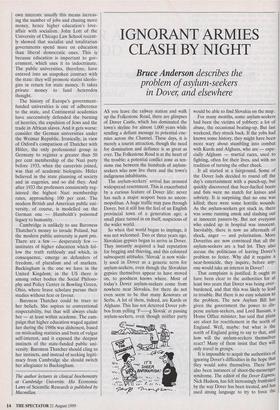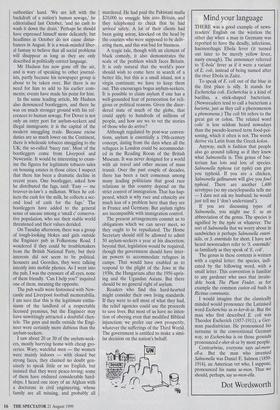IGNORANT ARMIES CLASH BY NIGHT
Bruce Anderson describes the
problem of asylum-seekers in Dover; and elsewhere
AS you leave the railway station and walk up the Folkestone Road, there are glimpses of Dover Castle, which has dominated the town's skyline for almost 1,000 years while sending a defiant message to potential ene- mies across the Channel. These days, it is merely a tourist attraction, though the need for domination and defiance is as great as ever. The Folkestone Road is at the heart of the trouble: a potential conflict zone as ten- sions rise between the hundreds of asylum- seekers who now live there and the town's indigenous inhabitants.
The asylum-seekers' arrival has aroused widespread resentment. This is exacerbated by a curious feature of Dover life: never has such a major seaport been so uncos- mopolitan. A huge traffic may pass through Dover, but it still has the feel of an English provincial town of a generation ago; a small place turned in on itself, suspicious of the wider world.
So when that world began to impinge, it was not welcomed. Two or three years ago, Slovakian gypsies began to arrive in Dover. They instantly acquired a bad reputation for begging and thieving, and this coloured subsequent attitudes. 'Slovak' is now wide- ly used in Dover as a generic term for asylum-seekers, even though the Slovakian gypsies themselves appear to have moved on, to goodness knows where. Most of today's Dover asylum-seekers come from nowhere near Slovakia, for there do not even seem to be that many Kosovars or Serbs. A lot of them, indeed, are Kurds or Afghans. This has not deterred Dover yob- bos from yelling 'F g Slovak' at passing asylum-seekers, even though neither party , would be able to find Slovakia on the map.
For many months, some asylum-seekers had been the victims of yobbery: a lot of abuse, the occasional beating-up. But last weekend, they struck back. If the yobs had known some history, they might have been more wary about stumbling into combat with Kurds and Afghans, who are — espe- cially Afghans — martial races, used to fighting, often for their lives, and with no tradition of turning the other cheek.
It all started at a fairground. Some of the Dover lads decided to round off the day's entertainment with a punch-up, but quickly discovered that beer-fuelled boots and fists were no match for knives and sobriety. It is surprising that no one was killed; there were some horrific wounds. As the asylum-seekers got stuck in, there was some running amok and slashing out at innocent passers-by. But not everyone who ended up in hospital was innocent. Inevitably, there is now an aftermath of shock, anger — and polarisation. More Doverites are now convinced that all the asylum-seekers are a bade lot. They also accuse the politicians of leaving Dover's problem to fester. Why did it require a near-homicide, they inquire, before any- one would take an interest in Dover?
That complaint is justified. It ought to have been clear to the authorities for at least two years that Dover was being over- burdened, and that this was likely to lead to trouble. But there is no easy solution to the problem. The new Asylum Bill has given the government the power to dis- perse asylum-seekers, and Lord Bassam, Home Office minister, has said that plans are afoot for resettlement in the north of England. Well, maybe: but what is the north of England going to say to that, and how will the asylum-seekers themselves react? Many of them insist that they Will only travel in groups. It is impossible to acquit the authorities of ignoring Dover's difficulties in the hope that they would solve themselves. There have also been instances of shoot-the-messenger syndrome. The editor of the Dover Express, Nick Hudson, has felt increasingly frustrated by the way Dover has been treated, and has used strong language to try to force the authorities' hand. 'We are left with the backdraft of a nation's human sewage,' he editorialised last October, 'and no cash to wash it down the drain.' Perhaps he should have expressed himself more delicately, but headlines in October do not cause distur- bances in August. It is a weak-minded liber- al fantasy to believe that all social problems will disappear as long as they are only described in politically correct language.
Mr Hudson has now gone off the air, and is wary of speaking to other journal- ists, partly because his newspaper group is about to be taken over. But there is no need for him to add to his earlier com- ments; events have made his point for him.
In the same leading article, Mr Hudson also denounced bootleggers, and there he was on much stronger ground with his ref- erences to human sewage. For Dover is not only an entry port for asylum-seekers and illegal immigrants; it is the capital of the modern smuggling trade. Because excise duties are so much lower on the Continent, there is wholesale tobacco smuggling to the UK; the so-called `batty run'. Most of the bootleggers come from Liverpool and Newcastle. It would be interesting to exam- ine the figures for legitimate tobacco sales on housing estates in those cities; I suspect that there has been a dramatic decline in recent years. One bootlegger, asked how he distributed the fags, said: 'Easy — me bruvver-in-law's a milkman. When he col- lects the cash for the milk, he collects a sec- ond load of cash for the fags.' The bootleggers have added to the general sense of unease among a 'small c' conserva- tive population, who see their stable world threatened and their values derided.
On Tuesday afternoon, there was a group of tough-looking blokes and girls outside the Engineer pub in Folkestone Road. I wondered if they could be troublemakers from the British National Party, but their interests did not seem to be political. Scousers and Geordies, they were talking intently into mobile phones. As I went into the pub, I was the cynosure of all eyes, none of them friendly. 'Can I help you?' inquired one of them, meaning the opposite.
The pub walls were festooned with New- castle and Liverpool football memorabilia. I am sure that this is the legitimate enthu- siasm of the landlord of a respectable licensed premises, but the Engineer may have unwittingly attracted a doubtful clien- tele. The guys and molls outside the Engi- neer were certainly more dubious than the asylum-seekers.
I saw about 20 or 30 of the asylum-seek- ers, mostly hurrying home with cheap gro- ceries. Wary, watchful men — the women were mainly indoors — with closed but strong faces, they claimed no doubt gen- uinely to speak little or no English, but insisted that they were peace-loving; some of them have endured considerable hard- ships. I heard one story of an Afghan with a doctorate in civil engineering, whose family are all missing, and probably all murdered. He had paid the Pakistani mafia $20,000 to smuggle him into Britain, and they telephoned to check that he had arrived safely. A lot of their clients had been going astray, knocked on the head by the couriers who were supposed to be deliv- ering them, and this was bad for business.
A tragic tale, though with an element of black comedy, it also demonstrates the scale of the problem which faces Britain. It is only natural that the world's poor should wish to come here in search of a better life, but this is a small island, not a virgin continent; we have to keep them out. This encourages bogus asylum-seekers. It is possible to claim asylum if one has a well-grounded fear of persecution for reli- gious or political reasons. Given the disor- dered state of much of the globe, that could apply to hundreds of millions of people, and how are we to vet the stories of those who do arrive?
Although regulated by post-war conven- tions, asylum is essentially a 19th-century concept, dating from the days when all the refugees in London could be accommodat- ed in the Reading Room of the British Museum. It was never designed for a world with air travel and other means of mass transit. Over the past couple of decades, there has been a tacit consensus among many leading politicians that good race relations in this country depend on the strict control of immigration. That has hap- pened, which is why race and ethnicity are much less of a problem here than they are in France and Germany. But asylum rights are incompatible with immigration control.
The present arrangements commit us to obligations which we can never meet. so they ought to be repudiated. The Home Secretary should still be allowed to admit 50 asylum-seekers a year at his discretion; beyond that, legislation would be required, though the government should have inter- im powers to accommodate refugees in camps. That would have enabled us to respond to the plight of the Jews in the 1930s, the Hungarians after the 1956 upris- ing and the Ugandan Asians. But there should be no general right of asylum.
Readers who find this hard-hearted might consider their own living standards. If they were to sell most of what they had, the relief agencies could use the proceeds to save lives. But most of us have no inten- tion of obeying even that modified Biblical injunction; we prefer our own prosperity, whatever the sufferings of the Third World. The government is entitled to make a simi- lar decision on the nat'on's behalf.



























































 Previous page
Previous page